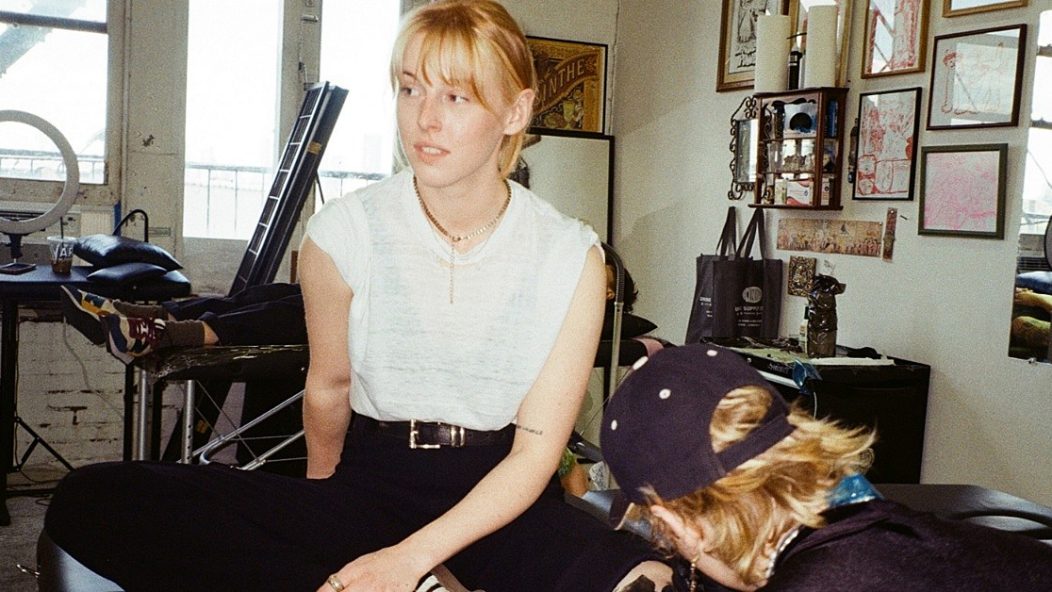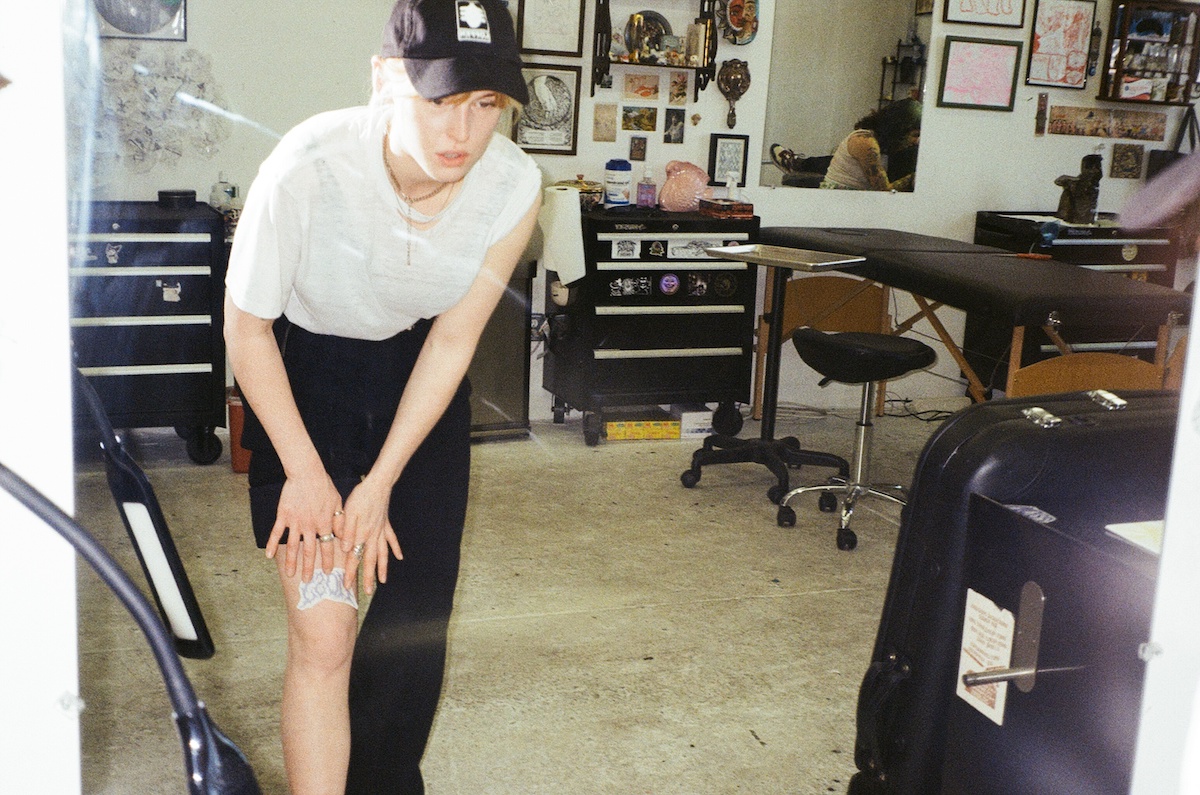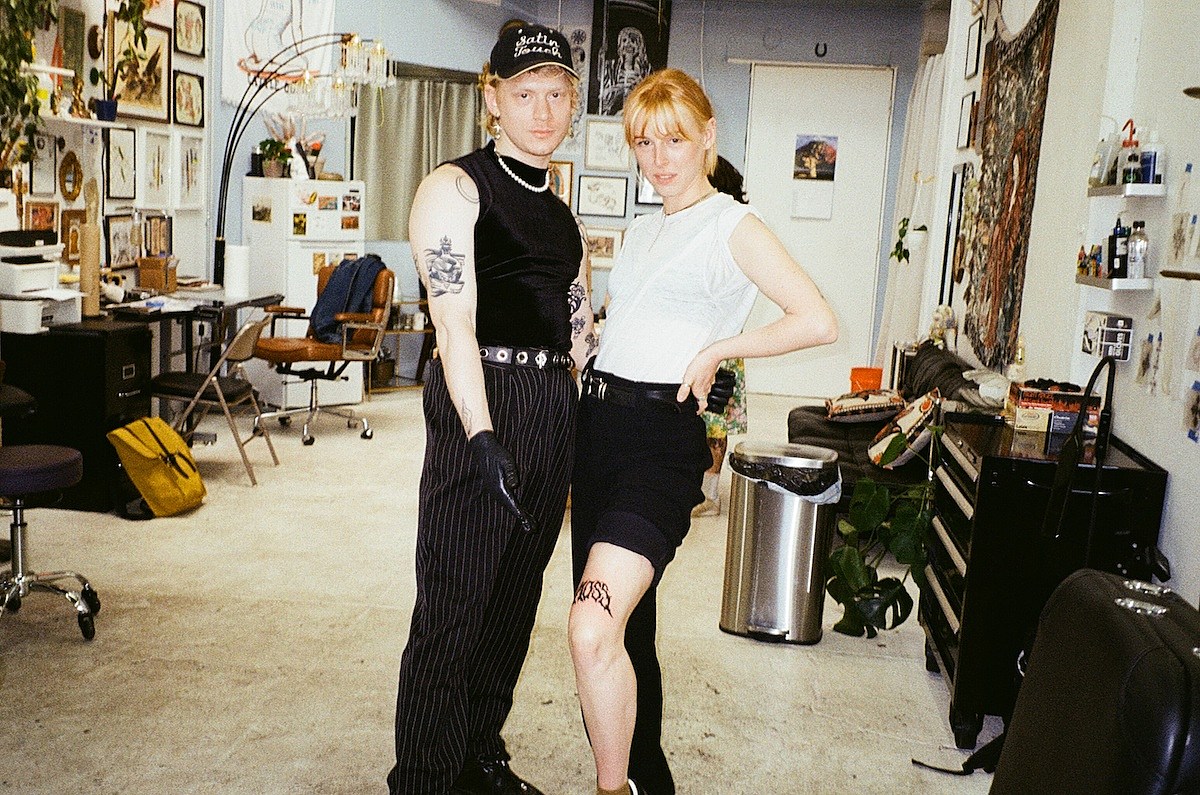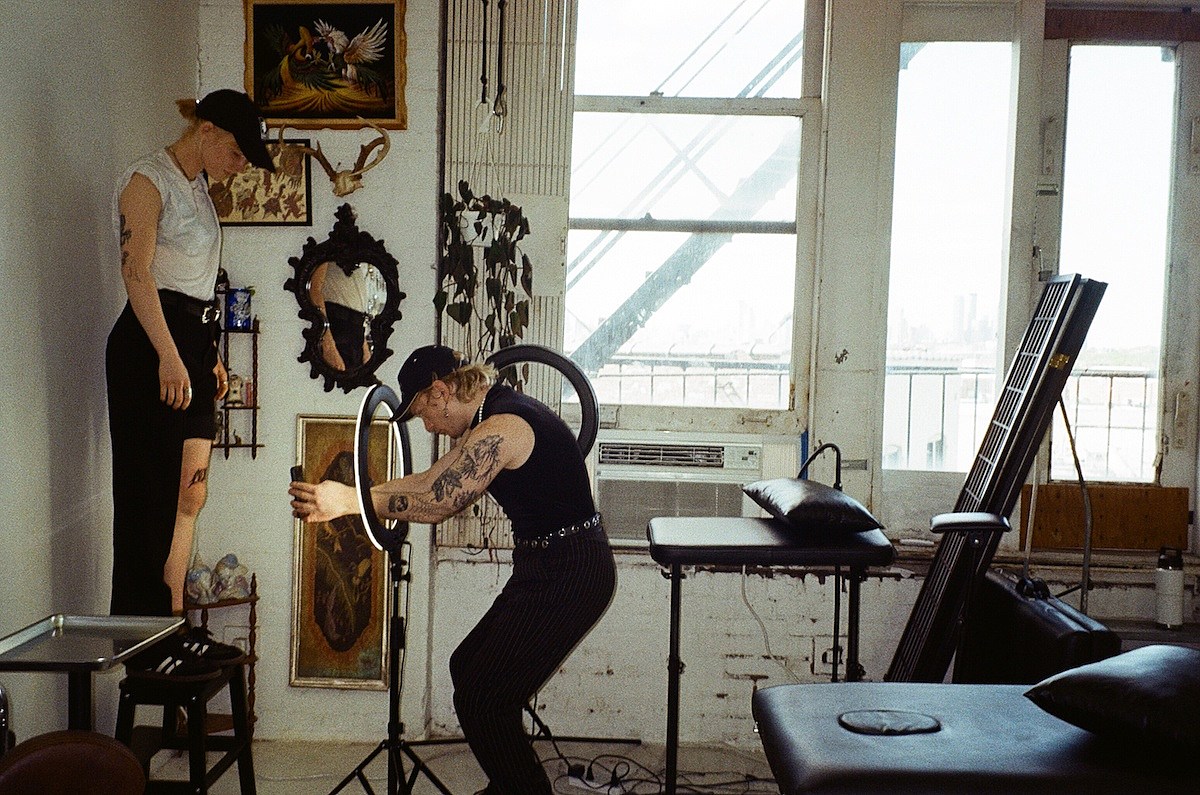
Fenne Lily's honest indie rock sees the bigger picture
Fenne Lily is having a “real top-to-toe day” when I meet her on a Saturday afternoon in East Williamsburg. The Dorset-born singer-songwriter has just returned from the first leg of tour, supporting her latest record Big Picture (released in April on Dead Oceans) across Europe and the U.K. Tomorrow morning, she’ll grab a flight to California, where she’ll kick off her North American co-headliner tour with her close collaborator, indie-folk singer-songwriter Christian Lee Hutson. But before she hops back on the road, Lily has some business to take care of in her new home city. Namely, she jokes, becoming “a whole new person.”
I catch her before the first of her day’s transformations: getting a new tattoo from Asa, one of the many New York-based friends whom Lily will see later today for her “one evening only,” hello-and-goodbye hurrah. The duo became fast friends after Lily moved from Bristol to Brooklyn last September — being introduced by a mutual friend with whom Lily had bonded over their shared love of playing pool. (Lily later mentions that her “I could become anyone!” American Dream trajectory — which she, of course, says with a heavily sarcastic mid-Atlantic accent — has manifested as “back to being me, plus playing pool all of the time.”) Once the appointment is over, Lily will jet over to Bushwick, sort-of-near-Carmelo’s serving as her vague North Star, where she’ll get her red-rooted hair bleached and cut.
Read more: How boygenius are breaking big
“I wasted so much of my life not doing something I really wanted to do because it’s ‘permanent,’ in inverted commas,” Lily says. She’s talking about her mother’s warnings against bleaching her hair, not about getting tattoos. But Lily includes tattoos on her list of all things impermanent. Which, to her, is everything. “Literally nothing lasts forever,” she says, “If you don’t like your record, just pull it off Spotify. If you don’t like your tattoo, cover it up. If you don’t like your hair, cut it off.”
It’s clear that this “business of letting go” mindset — as she coins it in her lilting Big Picture track “Superglued” — is a hard-earned wisdom for Lily. In response to her own existential waffling on the kinetic track “Pick,” Lily’s layered vocals orbit back like a cyclical lesson: “Nothing is the one thing that goes on forever.”
She speaks in absolutes as she recalls the experiences that forged this ethos. “I’ve never really regretted anything in such a big way as I’ve regretted not doing stuff,” she says. “I’ve never regretted leaving a movie early. I’ve only regretted staying in the movie longer than I wanted to be in it.” (She most recently walked out of The Fabelmans, a decision that she still backs strongly.) Lily points to a tattoo on her arm, which Asa will soon cover up, as exhibit B of things she regrets because she “didn’t fully commit.”

[Photo by Emma Carey]
Her current residence in New York is perhaps the ultimate testimonial for letting go. Now situated in Bedford-Stuyvesant for the better part of a year, Lily says that her move to New York was fairly seamless. “The scary, hard part was trying to find out whether I was the kind of person that could see something through like that.” In the months leading up to her move, Lily says she was most fearful that she would “wuss out” on something she knew she wanted to do.
“It’s the same for writing, the same for falling in love,” she reflects. “The scary part isn’t the execution of it. It’s thinking about whether you’re brave enough to actually put it into action.”
Today’s tattoo is one that Lily is going full force into. When I arrive at Pet Names, a private tattoo studio tucked within the winding corridors of an artists’ warehouse, Asa has a few variations of the illustration printed up for placement. “MOSS” the purple-hued stencils read in sprawling, barbed lettering. “My dead dog’s name,” Lily explains matter-of-factly.
Though Lily grew up alongside many animals on her family farm in Dorset, she describes Moss as “the good one.” “If he was a person, he’d be a friend,” she says of the collie. Her other dog would be “more of a roommate,” Lily says — given how his neuroses clash with her all-Aquarius household — while her cat would be “more like a weird uncle.”
Lily got the news of Moss’ passing while on tour, her mother calling while she and her bandmates were at a gas station getting coffee. “It was sad because it had been really warm and pretty,” she says, “and we got to wherever — I think it was Boston. It was so cold, and the tears were hurting my eyes.” Lily was able to visit Moss on a recent trip home just before the U.K. tour, where she often makes the pilgrimage to his resting place at the top of their garden. “Every time I go home, my mom is like, ‘Do you wanna see Moss’ grave?’ and I’m like, ‘Sure,’” she laughs.
Save for some “ankle shit,” MOSS will be Lily’s first leg tattoo — arching just over her kneecap. She’ll later realize an accidental significance to this placement: “He loved licking knees … Now that I’m thinking about it, it’s kind of perfect.” She fidgets with different variations in the mirror trying to find her new “knee identity,” seeking guidance from Asa. She asks if I’d approve of her swapping to a neck tattoo, and Asa jokes that a needle buzzing at her throat would “pretty much negate the whole interview process.” “This was kind of your idea,” they tease Lily. “It’s like Hot Ones.”

[Photo by Emma Carey]
Aside from this counsel, Lily is thankful that there isn’t an audience surrounding her decision — compared to many public-facing tattoo shops located in storefronts.
“When I’m trying to change something or make a creative decision, I don’t like being watched,” she explains, as I regrettably realize I’ve been watching her try on different tattoo placements for the last 10 minutes. Lily says this was the reason she decided to move from her first apartment in Bed-Stuy by the Myrtle Avenue train station. “The windows face onto the road in a way that I was like, ‘I don’t think I could ever write a song in this room. I feel like I can be heard and seen at all times,’” she says.
Privacy while songwriting was a major crux in the creation of Big Picture for Lily, who wrote most of the album while living with her partner in Bristol during lockdown. Lily says the instability of the pandemic made “everything feel shaky” — and she began to question how much she could, or should, keep holding onto in her life. “This is part of the reason why this record doesn’t come above a particular loudness threshold,” she says. “It’s quite a restrained, quiet, minimal record because I was writing basically at two decibels in my storage cupboard that I turned into a studio.”
As Lily processed feelings of uncertainty, stagnancy, stability, and claustrophobia within the confines of this cupboard, she began to see writing on the wall. “I was writing stuff and then being like, ‘Fuck, I wish I hadn’t written that,’” she says. “Because I have to be around this person that I have realized that deep down I feel like this about.” In a way, Lily’s sense of pressure to “write in code” about her and her partner ended up facilitating this process — allowing her to lean into her inner omniscience by taking on the role of a narrator observing two characters.

[Photo by Emma Carey]
On release day, which Lily has been known to dread, the one review she cared about was a text from her ex-partner for the first time in a year. “I didn’t know I needed that,” she says. “I didn’t know that I needed them to hear the record and accept it as something that, even though it describes our story, is completely separate from our story.” She felt that the interaction was a mutual acceptance of the fact that “one plus one is sometimes three” — that they are two people, but the creation of this album is a separate, third thing. “So that was very like, [Exhales.] ‘I can finally walk away and feel like I didn’t leave someone behind,’” she says. “Shit! I’m so pink!” she laughs, noticing her nearly finished new knee.
Lily has been careful not to discuss her ex too much in this press cycle — and not just for the sake of the Bechdel test. Though that has come to mind. “None of my albums, or talking about them, would pass that test. Which is a real shame,” she laughs. Lily says one of her main concerns is fear of making them uncomfortable. “And I also hate the feeling of, ‘I made something, but it’s being accredited to someone else’s influence on my life.’” Even when Lily is writing about love, she recognizes it as a mirror more than anything. “That’s the way that I’ve seen myself, unfortunately, which maybe makes me sound like an egotist,” she says.
Though perhaps less selfless on the surface than many love songs might like to posture themselves as, Lily’s take on love is one that’s truthful. “Love is a delicate string that you lend and carry around,” she sings with a distinct balance on “Pick.” Lily might use this string to retrace her steps back to the places it once unraveled, or she might choose to rewind it entirely and pick up somewhere new. But it’s always hers to hold.

[Photo by Emma Carey]
While Lily might have accessed much of this perspective on her own, she says her collaborations throughout the recording process ultimately helped to achieve the album’s positive framing. She points to her bandmates for the “lighter and brighter” sonic quality of the album, and collaborators like Brad Cook, Hutson, and Melina Duterte (Jay Som) for helping her get unstuck from certain hang-ups.
Unlike her first two records, 2018’s On Hold and 2020’s BREACH, which were both written retrospectively, Lily was still very much “in the weeds” of the experiences that Big Picture explores. “I almost needed help out of it,” she says. “I see a lot of the process of making music like closing a chapter and then being able to move on.” Though “catharsis” might readily be applied to this end goal, Lily says it doesn’t quite fit. “It’s more like making peace with something and then leaving it behind,” she elaborates. “I think having other people to help me let go of all that stuff was really helpful.”
She introduces her encore song at her new hometown venue, Music Hall of Williamsburg, as something of an epilogue to the show. (Or, an extra “nibble,” which she immediately verbally regrets pantomiming.) And it’s hard not to picture the moment as the ultimate post scriptum to Big Picture’s bookend. Recalling her first gig there, which was riddled with technical difficulties, she jokes that the venue feels like one of those people who you’re just always weird around for no reason. But, by the end of the night, she and the crowd feel more like old friends.
She compares returning to Bristol to “remeeting” someone you broke up with years ago. “I was like, ‘Oh, this isn’t the setting for my heartbreak. This is just a place that I loved, and I still love. I just outgrew it,” she says. “I didn’t feel sad to be back. I was happy that I left, but I was happy that I found it in the first place… And those things could all exist together.”










